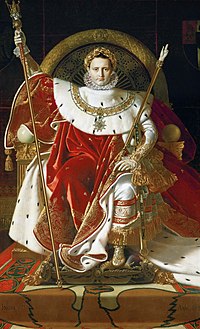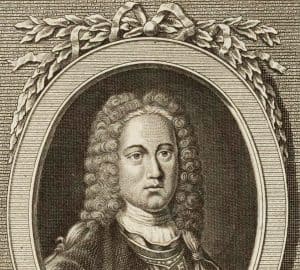
Napoleon Bonaparte’s rise to power is one of the great stories of European history. He was born the son of a minor noble on the island off the coast of Italy, yet in just a few decades he gained control of France and conquered most of Europe. He could do this because he had the skills and abilities required to seize favorable situations that he encountered and turn them to his own benefit. In his life, we can learn principles that are applicable to anyone, as well as dangerous traits common to many dictators in history who have abused their power.

1. Always Learning
The first characteristic of Napoleon is that he was diligent to always be improving himself and acquiring knowledge that would help him in future tasks. As a young man, he was a voracious reader, studying history, science and philosophy. He especially enjoyed the ancient classics, and modeled himself upon their heroes, like Caesar or Alexander the Great.
Later in life, when he was planning a military campaign, he would read books about the place in which he would be operating. Studying the country’s history, geography and culture made him better prepared for whatever he would encounter, and help him to avoid errors that previous generals had made.
He was also a very good interviewer. Although he was a proud man, he was not afraid to demonstrate his ignorance if the person he was speaking to could enlighten him. He would often grill someone with deep and perceptive questions, getting from them any information that would be useful. Even as commanding general, he would often personally interview captured prisoners, hoping to gain any information from them that he could.

2. Good General
Napoleon entered the French army at a time when quick advancement was possible. The French Revolution resulted in many royalist officers leaving the army, and in constant wars which gave the opportunity for young officers like Napoleon to advance through victory. Napoleon was very successful in his military campaigns, and that laid the foundation necessary for his political achievements. He fought 60 battles in his career, and lost only seven, mostly towards the end. He was talented both strategically and tactically. In campaign after campaign he defeated larger armies with a smaller force, through methods like moving boldly and quickly, defeating them in detail, cutting off their lines of retreat, and doing what his enemies least expected. He was undoubtedly a brilliant general, and many have counted him as the best general in world history.

3. Efficient Organizer
Bonaparte was not just a great general, he was also good at logistics. One of his most famous maxims is that, “An army marches on its stomach.” If troops are not well equipped and well fed, they can not be expected to fight well. Napoleon was very skilled at logistics. He ensured that the preparations were in place to keep his troops fighting effectively. He wrote many letters just about shoes, to make sure that his army would be able to keep marching. He was also quite financially astute. Even when he was spending vast amounts of money on imperial palaces, from time to time he would review the accounts and refuse to pay bills that he thought were unreasonable. This logistical competence was necessary to win his victories.

4. Brilliance
One essential feature of Napoleon’s character was his brilliance. Not only was he very smart, he could also handle many topics at once. He could dictate letter after letter to his secretaries, on a wide variety of topics, often without even stopping to think. He could also compartmentalize his mind. Even in the midst of a very stressful campaign, he could put the present situation behind him and think with incredible clarity about another separate issue. This also allowed him to make the most of his time. Even in the midst of a battle, he could clear his mind of all the stress and seize a moment to take a fifteen minute nap, waking refreshed to continue to direct the battle. He had an immense capacity for work, sometimes working for several days with virtually no rest.
Napoleon had an immense memory for details. It is related that during the campaign of 1805, one of his commanders could not locate his division. As his aides began to search through their maps and papers to find the location, the emperor told it to them from memory, where it would be positioned during the next three days, along with the strength and status of each unit.
5. Good Government
One thing that is common to many dictators is that they improve the government in the countries over which they rule. The legend about Mussolini is that he made the trains run on time. This is also true of Napoleon. When he came to power in France, he fixed many of the nation’s problems. He ensured that contractors and troops got paid on time. He subjugated the bandits that that been plaguing parts of the country since the Revolution. He also instituted the Napoleonic legal code in France, which is still the basis for French law today. It brought to France a single set of laws, wiping out the confusing remnants of feudalism. The emperor considered this to be his greatest accomplishment, writing, “[W]hat nothing will destroy, what will live forever, is my Civil Code.” The stability that all these reforms brought increased Napoleon’s popularity with the people, and gave him a greater tenure in power than anyone had enjoyed since the French Revolution.

6. Convincing Propaganda
Napoleon was a master of propaganda and popular manipulation. He knew how important the people’s opinion was, and used his rhetorical power to shape it for his purposes. One way he did this was by skillfully riding the tide of public opinion. When the French Revolution first began, he was a supporter of the Jacobins. Yet as his career advanced, he eventually got himself appointed first consul, then dictator, overturning many of the revolutionary principles with the reestablishment of titles of nobility, special honors, dynastic houses, and himself as a sovereign dictator. “The Revolution is over,” he said, “I am the Revolution.” Napoleon got the French people to accept him as the embodiment of the Revolution, even as he reversed many of its principles.
Personally, he was a man of simple tastes, preferring to wear a military uniform. Yet he knew the people wanted a show, so he wore extravagant outfits and lived in fancy palaces. He was willing to use religion for his purposes – portraying himself as a Muslim to the Egyptian Muslim, as an atheist to the French revolutionaries, and as a Catholic to the European Catholics. Personally caring little about religion, he used it to appeal to whatever people group he needed.
Napoleon was also very involved with the French press. The newspapers were under tight control, and if they published anything with which the emperor did not agree, they would be shut down. He was very cognizant of how the papers shaped public opinion, and would often write columns for the newspapers to make sure they espoused exactly his views. In those columns he was far from honest. Bonaparte exaggerated whenever he thought necessary, inflating his victories and covering up his defeats. When he ran for control of France in popular elections, he won in landslides. Yet he, and doubtless countless Bonapartists under him, still felt it necessary to fake the election results, making them even more favorable than they actually were.

7. Popular Charisma
Many of the early qualities worked together to give him an incredible charisma and popularity with his soldiers and people. When he escaped from his exile on the island of Elba and landed on the shores of France, he soon met the 5th Regiment of the French army, who had been sent to capture him. However, he simply dismounted from his horse and walked up to them, saying, “Here I am. Kill your Emperor, if you wish.” With that, the troops immediately switched sides, and joined him on his quest to regain control of France.
On the battlefield, he carried with him an aura of victory, even in the worst situations. He exuded confidence to his troops, inspiring them and assuring them that victory was certain. This was crucial to his victories, for as he said, “Moral force rather than numbers, decides victory.” Victory made him popular with the men. They were fighting under the man that had turned their country into a world power – one of the greatest generals in world history. Off the battlefield he demonstrated care for his soldiers. He would often inquire after their welfare, making sure that they had the food and supplies they needed. As one historian has written, he “inspired Frenchman and foreigners alike with fierce loyalty and devotion.”
These factors gave him incredible popularity in France. People still loved him even after his downfall. For years Napoleonic memorabilia was banned in France, but people still smuggled it in. One of my ancestors was a soldier under Napoleon, one of his Old Guard. He immigrated to America after Waterloo, but he still said that if he heard that Napoleon had turned to France, he would drop his new life and return to Europe to fight under his old commander.

Downfall
It was these seven characteristics that allowed Napoleon Bonaparte to achieve one of the most remarkable careers in the world. However, as he grew older, his abilities began to fade. He gained a lot weight, his health began to decline, and with it, his capacity for work. His pride and belief in his own destiny began to push him into wars he was not able to win, and his force of character turned into stubbornness. Although the older Napoleon was not the same as his younger self, he was still a force to be reckoned with. Even after he was defeated by the coalition, he escaped from the island of Elba, and in the Hundred Days regained control of France before being finally defeated at the Battle of Waterloo.
Further Reading
Napoleon: A Life by Andrew Roberts
The Napoleon Series






Thanks this information was very useful.
This helped me get my work done. And i
Learned a few new things.
i liked this information it is brilliant and because of it I could complete my work easily.
we agree.
Very good, will help with assignments now.
Weldone for great work done,i salute u people good interesting research which b
benefit the world of history at large,bigups to u guys
We think this is a awesome website. Very good information.
Good work I agree
This is some of the best info on the web. It gives you straight information and its easy to understand. Thank you!
Wonderful information and very useful, helped me a lot on my project, thanks !!
I won my debate against this dude thx
This site is trash, I failed my assignment
Matthew, sorry to hear you failed, but I’m not sure this site is responsible for whether you pass or fail.
… Don’t say you’re not sure, of course this site isn’t responsible for whether or not someone passes or fails. C’mon now.
Boy You failed because you are trash not the website
it is a very good as well as a informative and useful website.it helped me do my work quickly.awesome.!!!!!
Thanks a lot. I come to know many characters of The great Napoleon by reading your published article. It is astonishing.
Thanks once again.
An awesome executive summary of Napoleon which is so useful and helpful, indeed.
Is the author of this website Andrew Roberts?
No, this post was written by me, Joshua Horn.
Thank you so much for your work!
I am a French and I miss Napoleon.
this was not helpful at all.
Anyone who read A Tradition of Eighteen Hundred And Four ? I need help for his character traits according to the book .
I wake up depressed not knowing anything of happiness ever since peep died I have felt noting please help me and exile me just like him
this is good work
great work it helped me
Thank you very much, this will definitely help me on my essay 😀
horrible information, failed my exam
An interesting article. I was not here for a paper but casual reading. Thank you
I’m sorry to say I found the article disappointing. I happen to have taken a great interest in Napoleon given that he was probably the greatest threat to the European political system that ever arose. Europe was and is today based on a elitist system which thanks to propaganda, control of the media, a caste system in education, and an absence of open debate keeps power in the hands of an undeserving few and over a sheepish, dependent population. Unless I read too quickly you miss two ingredients to Napoleon’s success that were immensely important, and seem to forget that his success was mainly due to his ability to win battles. Firstly, his experience as an artillery officer had taught him the use of mobile artillery which he concentrated at critical points of the line with the brilliance that characterized him (he was an immensely intelligent man) in everything he did. But more importantly still, he retained the loyalty of his various commanders…generals, marshalls, as you will, of origins both noble and revolutionary, who were equally brilliant as well as dedicated and courageous in the extreme. His battles were almost always won by a Davout, a Ney, a Murat, often doing the “impossible” in the proverbial nick of time. Napoleon cleverly rewarded the best, promoted the best…something the European elite has never done. Were it not for the betrayal (lack of honour) of the Russian Czar and others…leaving aside the Duke of Wellington’s arguably even greater brilliance…he might well have changed the course of human history for the better.
i think dave needs to chill he is making these people that made the website very depressed why can’t you just appreciate it
Thank you for this article! I wish I was more like Napoleon in many ways!
This is awesome no doubt, got what i needed.
Very nice and helpful information
this helped me a lot on my assignment
this help me with my assignment
Thanks for writing this informative article.
But probably Napoleon was a voracious reader. Maybe he was also a vivacious reader too.
Thanks for pointing that out.
Thanks for the information, found it helpful !
Thanks for the valuable information about the great leader ..
It’s incredible to think that his influence was so strong that even after his downfall, people like your ancestor would have been ready to fight for him again. His legacy is a mix of brilliance and ambition, showing both the heights of human achievement and the consequences of overreach.